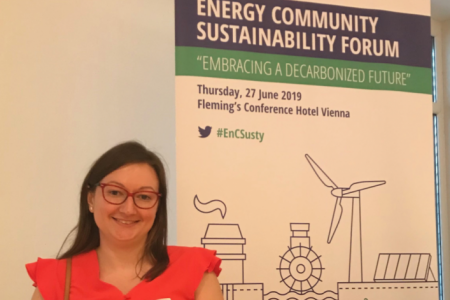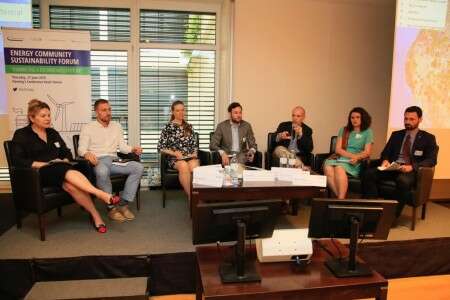The third in a row Sustainability Forum of the Energy Community entitled "Embracing a Decarbonized Future" was held in Vienna, June 27, 2019. Like in the previous years, the team from Belgrade Open School participated in the Forum. The Forum was an opportunity to hear in the same panel, the voices of not only decision-makers and the civil sector, but also investors, bankers, consultants and academic communities, all working in the sustainability field.
The Forum was jointly organized by the Energy Community, the "Balkan Green Foundation" and "The Nature Conservancy" in cooperation with the Heinrich Boell Foundation. At the Forum, Belgrade Open School had two participants: Mirjana Jovanović, project manager, and Varvara Aleksić, project assistant.
During the discussion, the question of distrust among stakeholders was raised. The answer lies in searching for common opportunities to overcome the obstacles. Participants agreed that small steps such as green grassroots initiatives, innovative business models, crowdfunding financing, and citizen’s initiatives in the field of energy - are path to decarbonized future in the countries of the Energy Community.
Having in mind the challenges that Western Balkan countries are facing while developing hydropower projects, the morning session of the Forum recalled the importance of transparent and inclusive environmental impact assessment procedures. Panelists agreed that hydropower is an important component of sustainability, if implemented in accordance with established rules and towards systematical approach of its negative impacts reduction. In addition to the procedures before and during the construction of new facilities, responsibility for managing the projects that have already been implemented and the mandatory monitoring should not be neglected. All these steps are necessary in order not to undermine the success of energy transition.
Environmental impact assessment, as well as strategic impact assessment, should be perceived by the decision-makers as a processes for support in adopting a deliberate decision, by investors as a processes for selecting the best alternative, and by citizens as a processes which will enable that their argumentation will be taken into account. For this reason, all stakeholders need to approach the environmental impact assessment in a proactive manner, rather than reacting only when problems are accumulated. In the end, one of the messages we could hear, referring to the European integration process is: "Do not transpose the rules of the European Union and the Energy Community just for the sake of transposition, but in a way that these rules can fulfill their purpose within the given circumstances."
While the first part of the Forum was dedicated to development of hydropower projects in the Western Balkans, the second part focused on investments in the decarbonized future – with a special attention to the Asian investment, innovative business models and practical problems that stand in the way for taking advantages of the great potential of renewable energy in Energy Community Contracting Parties. Challenges with public consultations procedures, non-compliance with state aid rules, not taking into consideration of external costs in electricity prices, misunderstanding the role of international institutions such as the Energy Community – all these lead to the conclusion that – a single regulatory frame for the European Union and the Western Balkans has to be a priority for both sides. Investors listen to the needs of the market and work in partnership with the states. Therefore, they are aware of the obligation and ready to be educated. A common denominator for all actors, and the key to decarburization is the long-term planning in the fields of energy and climate change. In addition, raising awareness about standards of the European Union and the benefits that their implementation bring to all stakeholders, should be the topic of future action.
As a rule, the day after the Sustainability Forum, an informal Ministerial Council was held, which is a meeting of the highest decision-making institution within the Energy Community. The goal is for members of the Ministerial Council, which are the ministers responsible for energy and environment, to get acquainted with the topics of the Forum and propose suggestions for further steps. Despite the importance of the topics and increasing pressure from both the expert and general public community, the lack of interest and presence of the highest state representatives was evident at this year's Ministerial Council. This only points where the sustainability issues are on the agendas in the countries of the region.
Varvara Aleksić - Belgrade Open School
Photo source: Belgrade Open School


